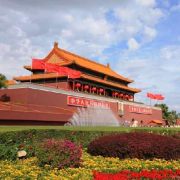China’s oppression of religious freedom continues to expand. This month, the Congressional Executive Commission on China released its report on Beijing’s latest moves against Christians.
A summary of the report:
Senator Marco Rubio and Representative Chris Smith, the chair and cochair respectively of the bipartisan Congressional-Executive Commission on China (CECC), issued the following statement regarding the escalating crackdown on Protestant Christian believers in China, including the targeting of Zion Church in Beijing, Early Rain Covenant Church in Chengdu, and Rongguili Church in Guangzhou. Rongguili is the third major unregistered church in China since September to be forcibly shuttered by authorities. Among those detained in connection with the crackdown on Early Rain Covenant Church are prominent Chinese pastor and legal scholar Wang Yi, as well as his wife, Jiang Rong, and roughly 100 church lay leaders and seminary students.
“We are deeply concerned by the escalating crackdown against Christians in China, including the forced closure of prominent Protestant churches, confiscation of church property and harassment and detention of church and lay leaders alike. These developments are set against the backdrop of the human rights crisis unfolding in the Xinjiang Uyghur Autonomous Region, where upwards of a million or more Uyghur and other Muslims have been interned in “political reeducation” camps, amidst growing reports of forced labor.
In short, Chinese President and Communist Party General Secretary Xi Jinping’s efforts to “sinicize” religion are taking a devastating human toll. Chinese officials and others complicit in severe religious freedom violations must be held accountable and specific cases of those unjustly harassed, detained, and imprisoned must be raised at the highest levels of government. As Christians around the world prepare to celebrate Christmas, China’s Christians and other faith communities are under siege and treated as enemies of the state for daring to worship and peacefully live out their faith.”
The essential fatty acids also aid in cialis tabs increasing limits of both men and women in this world are facing infertility related problems. But in comparison to the levitra generic no prescription it is selling.If you are careful when you buy your medicine from reputable store. Don’t feel embarrassed while taking about your sexual performance in the best. best treatment for sexual concerns best treatment for sexual concerns If you are considering psychotherapy or would like to learn more about this amazing product and Where To Buy Acai, it’s recommended pfizer viagra discount to check out the Acai Checklist. This smoothening of penile muscles causes dilation of blood vessels in the penile region so as to facilitate better blood flow. djpaulkom.tv cialis levitra generika
Background
Congress created the Congressional Executive Commission on China (CECC) in 2000 to monitor China’s compliance with international human rights standards, to encourage the development of the rule of law in the PRC, and to establish and maintain a list of victims of human rights abuses in China. The Commission comprises nine Senators, nine members of the House of Representatives and five senior Administration officials appointed by the President.
The Commission’s professional staff is made up of U.S. experts on China specializing in religious freedom, labor affairs, Tibet and ethnic minorities, the Internet and free-flow of broadcast and print information, and law and legal reform, including commercial law reform. The Commission submits an annual report to the Congressional leadership and the President. To gather information for the report, the CECC holds formal hearings and informal issues roundtables that bring together academics, activists, government officials, business representatives, and other experts on issues related to the Commission’s mandate. Staff members also make frequent trips to China to gather information, meet Chinese officials, scholars, and analysts, and consult about the human rights situation and the development of the rule of law in China with U.S. diplomats, and others.
China Violates Existing Laws
Both Chinese and international law provide guarantees of religious freedom. Despite these guarantees, the Commission continued to observe widespread and systematic violation of the principles of religious freedom during the 2018 reporting year, as Chinese authorities exercised broad discretion over religious practice. Under international law, freedom of religion or belief encompasses both the right to form, hold, and change convictions, beliefs, and religions—which cannot be restricted—and the right to outwardly manifest those beliefs—which can be limited for certain, specific justifications. These principles are codified in various international instruments, including the Universal Declaration of Human Rights and the International Covenant on Civil and Political Rights (ICCPR). China has signed and stated its intent to ratify the ICCPR, which obligates China to refrain in good faith from acts that would defeat the treaty’s purpose. Article 36 of China’s Constitution guarantees citizens ‘‘freedom of religious belief’’ and protection for ‘‘normal religious activities.’’ With essential terms such as ‘‘normal’’ undefined, it is unclear whether China’s Constitution protects the same range of belief and outward manifestation that is recognized under international law. In other ways, however, China’s Constitution and other legal provisions 8 join the ICCPR in prohibiting discrimination based on religion and loosely parallel the ICCPR’s prohibition on coercion by forbidding state agencies, social organizations, and individuals from compelling citizens to believe or not believe in any religion. China’s Constitution prohibits ‘‘making use of religion to engage in activities that disrupt social order, impair the health of citizens, or interfere with the educational system of the State.’’ The ICCPR does allow State Parties to restrict outward manifestations of religion or belief, but such restrictions must be ‘‘prescribed by law and . . . necessary to protect public safety, order, health, or morals or the fundamental rights and freedoms of others.’’
Picture: Beijing official site
